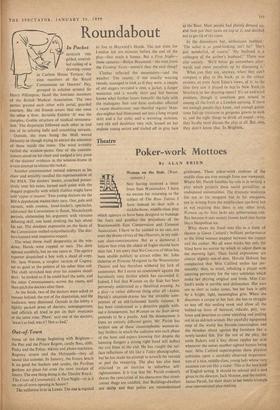Roundabout
In Pocket
BENEATH THE gilded, enscrol- led ceiling of a drawing - room
in Carlton House Terrace, the nine members of the Royal Commission on Doctors' Pay, grouped in echelon around Sir Harry Pilkington, faced the fourteen members of the British Medical Association. The two parties greeted each other with jovial, guarded courtesy, like old friends aware that one owes the 'other a fiver. Invisible Exhibit 'A' was the complex, Gothic structure of medical remunera- tion. The disputants followed each other in and out of its echoing halls and crumbling terraces.
Outside, the trees lining the Mall waved furiously as though trying to attract the attention of those inside the room. The wind irritably rattled the window-panes. One of the commis- sioners stood on his chair and wedged a tiny piece of the doctors' evidence in the window-frame in a vain attempt to silence the racket.
Another commissioner twisted sideways in his chair and amiably needled the representatives of the BMA. The doctors' leader, crouched posses- sively over his notes, turned each point with the dogged pugnacity with which Galileo might have said `eppur si muove.' Two young doctors on the BMA deputation waited their turn. One, pale and earnest, with rimless, band-leader's spectacles, addressed the Commission in fluent, Macaulayish periods, elaborating his argument with virtuoso debating skill, one hand stroking the hair about his ear. The deadpan expression on the faces of the Commission melted sympathetically. The doc- tors listened with impassive respect.
The wind threw itself desperately at the win- dows. Hands were cupped to ears. The door opened stealthily, but no one came in. The agency reporter dispatched a boy with a sheaf of copy. Mr. Sam Watson, a tougher version of Cagney, sat as quiet as the pattern of his sober blue suit. The cloth stretched taut over his massive shoul- ders : he looked as if he could hurl the table, and the other Commissioners, across the room, and then pitch the doctors after them.
At the finish, two of the doctors were asked to remain behind; the rest of the deputation, and the audience, were dismissed. Outside in the lobby a tightly packed press of doctors, newspapermen, and officials all tried to put on their overcoats at the same time. 'Phew,' said one of the doctors, 'wasn't so bad, was it? Not so bad.'
Out-of-Town
THINK OF ten things beginning with Brighton-1- thePier and the Prince Regent, candy floss, cliffs, Pinky and the Police; bikinis and photo machines, Regency streets and the Metropole—they all sound like summer. In January, the frozen beach Is no good for buckets and spades, the .Pavilion gardens no place for even the most resolute of lovers. The one thing doing is the Theatre Royal : The Coast of Coromandel.•A First Night—or is it an out-of-town opening in Sussex?
The authoress lives in Lewes. The star is reputed to live at Hayward's Heath. The last train for London left ten minutes before the end of the play—that made jt Sussex. But a First Night— those cameras—Binkie Beaumont—the man from the Evening News—weren't they the real thing?
Clothes reflected the uncertainty—and the weather. The county, if not exactly wearing tweeds, managed to look as if they were; a couple of old stagers revealed a coat, a jacket, a Jaeger waistcoat and a woolly shirt and hid heaven knows what further layers beneath; the lady with the mahogany hair and false eyelashes affected a rayon theatre-coat; one cheerful regular Mon- day-nighter had blossomed out into a long striped skirt and a fur stole; and a wavering skeleton, very old and doubtless very rich, leaned on her zealous young escort and trailed off in grey lace to the floor. Most people had plainly dressed up, and then put their coats on top of it, and decided not to get rid of the coats.
In the doWnstairs bar, enthusiasm babbled : 'The sailor is so good-looking, isn't he?' She's just wonderful, of course.' My husband is a colleague of the author's husband !' There was also anxiety : 'We'd better go somewhere after- wards and cheer ourselves up by discussing it.'
What can they say, anyway, when they can't compare a play to the book, or to the critics' reviews, or even Aunt Edna's views, of it; to the time they saw it played in rep/in New York/in Stratford/in her dressing-room? It's an awkward problem, though it somehow gets missed in among all the froth at a London opening. If there are enough people they know, and enough galop- tious full-up creatures in gorgeous gowns to look at, and the right things to drink all round—why, they hardly need discuss the play at all. But, alas, they didn't know that. In Brighton.










































 Previous page
Previous page